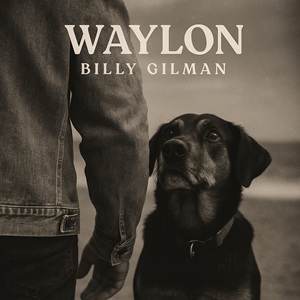Billy Gilman’s latest single, “Waylon,” is not just a moving Bluegrass ballad—it’s a lifeline disguised as song. Released in partnership with the American Foundation for Suicide Prevention (AFSP) during Mental Health Awareness Month, the track is as tender as it is vital. Featuring a quiet, acoustic backdrop of fiddle, mandolin, banjo, and guitar, the song leans into the warmth of traditional country instrumentation while exploring the far heavier themes of loneliness, survival, and the redemptive power of companionship—especially the four-legged kind.
FACEBOOK: https://www.facebook.com/billygilman/
The track opens with Gilman’s unmistakable tenor, weathered yet emotionally open, gently drawing the listener into the intimate story of someone who’s hit rock bottom. “Please leave me Waylon,” Gilman sings, and the weight of that line lands like a whisper in a quiet room. That Waylon is a dog—perhaps the only remaining piece of unconditional love the narrator has left—makes the sentiment even more poignant. The lyrics strike a delicate balance: they never romanticize despair, but instead offer an unflinching look at someone surviving one breath, one pawprint at a time.
Gilman co-wrote the song with Dan Murph and Philip Douglas, and their craftsmanship shows in the restrained lyricism and evocative storytelling. “Waylon” doesn’t rely on melodrama; it instead trusts its sparse imagery and raw emotion to do the heavy lifting. This is what country—and particularly Bluegrass—does best: tell personal stories with universal impact.
There’s a long tradition in country music of tackling mental health and existential pain through song. Tracks like Chris Stapleton’s “Fire Away,” Miranda Lambert’s “Tin Man,” and Brandi Carlile’s “That Wasn’t Me” come to mind. These songs walk the line between grief and healing, much like “Waylon.” Similarly, Jason Isbell’s “Elephant” faces death head-on through the lens of a deteriorating relationship, while Ashley McBryde’s “Girl Goin’ Nowhere” deals with self-worth and perseverance. “Waylon” deserves its place among these works—not because it mimics them, but because it brings something new: the idea that sometimes it’s not a person, but a pet, that keeps us grounded.
Instrumentally, “Waylon” is beautifully executed. Gilman is joined by a stellar group of musicians: John Mailander’s fiddle adds mournful texture, Jarrod Walker’s mandolin and Gabe Hirshfeld’s banjo pick with quiet determination, and Martha Christian’s harmony vocals wrap around Gilman’s voice like a blanket on a cold night. The arrangement is subtle and deeply respectful of the song’s emotional gravity. There’s no need for dramatic crescendos or big hooks here—the honesty is enough.
That honesty is what makes “Waylon” such a standout. This isn’t a song that demands attention; it earns it, slowly and sincerely. By aligning with AFSP and offering the track as part of a larger conversation around mental health, Gilman turns art into advocacy. It’s a generous gesture, one that acknowledges music’s ability to reach where even the best intentions sometimes can’t.
Much like man’s best friend, “Waylon” is a quiet triumph—a song that doesn’t just entertain, but matters. And in a genre built on storytelling and survival, that’s the highest praise there is.
Mark Druery
 IndieShark Music News, Reviews & Interviews
IndieShark Music News, Reviews & Interviews



